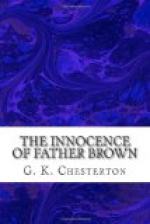“Well,” said Angus heavily. “I’m afraid I’ve come on business, and rather jumpy business at that. The fact is, Flambeau, within a stone’s throw of your house is a fellow who badly wants your help; he’s perpetually being haunted and threatened by an invisible enemy —a scoundrel whom nobody has even seen.” As Angus proceeded to tell the whole tale of Smythe and Welkin, beginning with Laura’s story, and going on with his own, the supernatural laugh at the corner of two empty streets, the strange distinct words spoken in an empty room, Flambeau grew more and more vividly concerned, and the little priest seemed to be left out of it, like a piece of furniture. When it came to the scribbled stamp-paper pasted on the window, Flambeau rose, seeming to fill the room with his huge shoulders.
“If you don’t mind,” he said, “I think you had better tell me the rest on the nearest road to this man’s house. It strikes me, somehow, that there is no time to be lost.”
“Delighted,” said Angus, rising also, “though he’s safe enough for the present, for I’ve set four men to watch the only hole to his burrow.”
They turned out into the street, the small priest trundling after them with the docility of a small dog. He merely said, in a cheerful way, like one making conversation, “How quick the snow gets thick on the ground.”
As they threaded the steep side streets already powdered with silver, Angus finished his story; and by the time they reached the crescent with the towering flats, he had leisure to turn his attention to the four sentinels. The chestnut seller, both before and after receiving a sovereign, swore stubbornly that he had watched the door and seen no visitor enter. The policeman was even more emphatic. He said he had had experience of crooks of all kinds, in top hats and in rags; he wasn’t so green as to expect suspicious characters to look suspicious; he looked out for anybody, and, so help him, there had been nobody. And when all three men gathered round the gilded commissionaire, who still stood smiling astride of the porch, the verdict was more final still.
“I’ve got a right to ask any man, duke or dustman, what he wants in these flats,” said the genial and gold-laced giant, “and I’ll swear there’s been nobody to ask since this gentleman went away.”
The unimportant Father Brown, who stood back, looking modestly at the pavement, here ventured to say meekly, “Has nobody been up and down stairs, then, since the snow began to fall? It began while we were all round at Flambeau’s.”
“Nobody’s been in here, sir, you can take it from me,” said the official, with beaming authority.
“Then I wonder what that is?” said the priest, and stared at the ground blankly like a fish.
The others all looked down also; and Flambeau used a fierce exclamation and a French gesture. For it was unquestionably true that down the middle of the entrance guarded by the man in gold lace, actually between the arrogant, stretched legs of that colossus, ran a stringy pattern of grey footprints stamped upon the white snow.




